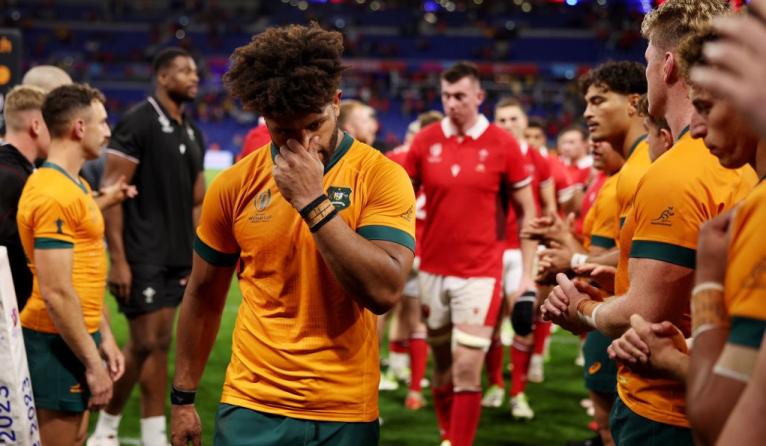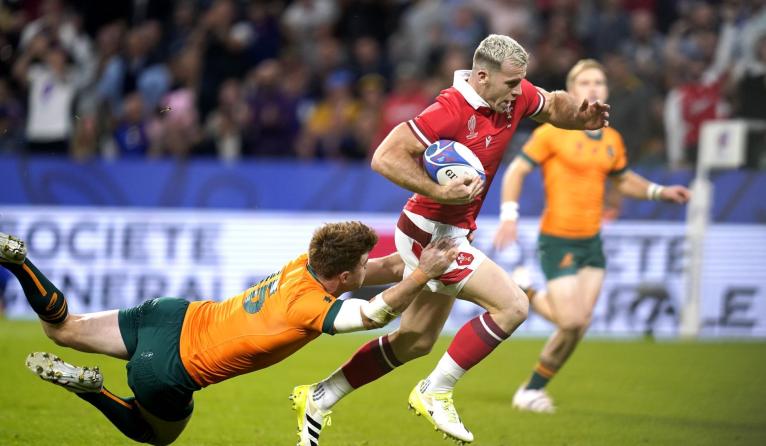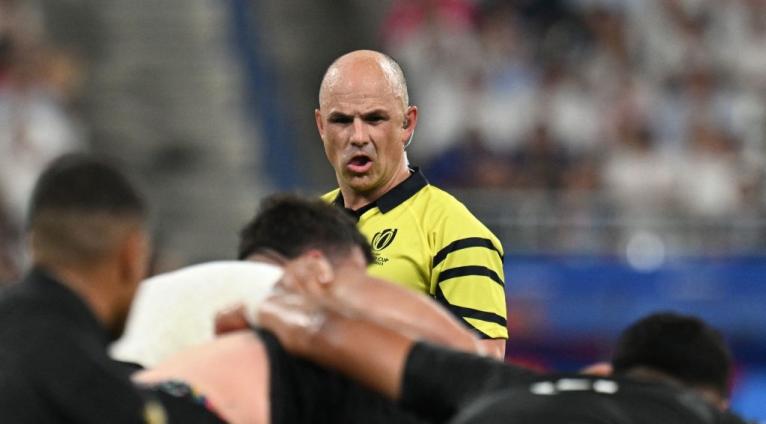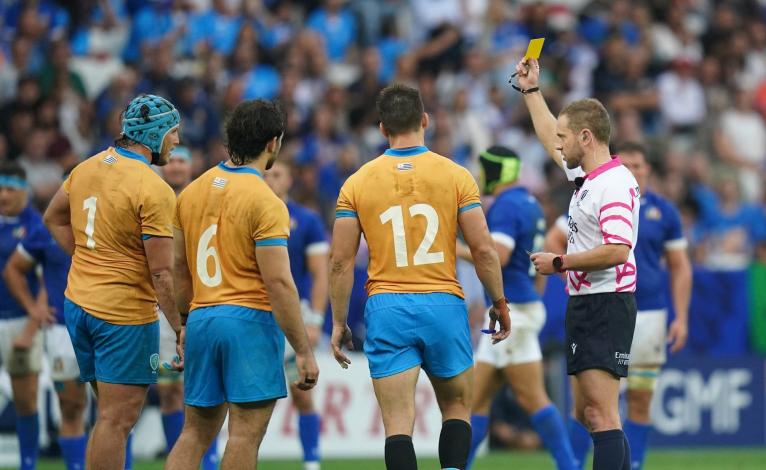Ref Watch: Wayne Barnes was right

After three rounds of pool stage action the World Cup limbering up is done, we’ve had plenty of opportunity to cast an eye over the competition and work out who makes the grade and who is unlikely to progress much further into the tournament.
I refer of course not to South Africa, Ireland and France or Argentina and Australia but the big beasts of the refereeing world who have all now had at least two outings with the whistle.
The world’s most-capped referee Wayne Barnes is certainly the sole remaining veteran of France 2007 among the match officials and players – perhaps there are some members of support teams with similar longevity?
After a relatively gentle introduction to the tournament when he oversaw Ireland’s comfortable win over Tonga, this weekend saw Barnes in the middle of Wales v Australia – a match vital to both sides’ progression hopes.
At the helm of an all-English team of officials, the Gloucestershire barrister cruised through this potentially tricky assignment with the minimum of fuss. As ever his communication with the players was exemplary and his management and decision-making almost word perfect despite a few social media suggestions to the contrary.
Ball emerging from a ruck
Barnes pinged Aussie no.8 Rob Valetini shortly before half-time at a crucial point in the match when the ensuing three points took Wales into the break with a 16-6 advantage.
The back-rower reacted quickest when the ball spilled loose at the rear of a Wales ruck and coming from an onside position he dived to ground to secure it.
Sitting alongside Nick Mullins in the commentary box 95-times-capped Jamie Roberts was aghast when Barnes blew a penalty. “That’s a poor call,” he quickly advised the viewing public.

Barnes himself was almost apologetic in his explanation to the Wallabies.
“I know, I know…but it’s the law,” he confided to anyone willing to listen.
And despite what Roberts believed the veteran Englishman was correct in his call – under law 15.16 (d) a player may not drop on a ball emerging from and in close proximity (defined as a metre) to a ruck.
Elsewhere on the field going to ground to claim a loose ball is fine – but presumably for safety reasons it has never been permissible immediately after a ruck.
Advantage
A very wise man who is sadly no longer with us used to tell developing referees: “The only consistent thing about advantage is that you should always play it.”
In his use of the advantage law Barnes twice showed us why having a feel for the game is so vital to being a good referee and why it’s application cannot be rigidly black and white.
On the stroke of half-time Wales had a penalty advantage following a scrum offence and opted to attack with ball in hand.
Davies, Anscombe and North combined to send Rees-Zammit racing to the line where he was held in goal by Australia’s scramble defence.

Davies then asked Barnes to go back for the penalty to which he replied: “You went 55 metres and almost scored. Advantage over.”
Having given Wales time and space which they used to create a clear scoring opportunity Barnes quite reasonably felt his job was done.
Wales’ no.9 was again involved five minutes after the restart when with another penalty advantage being played from a point just inside the eventual winners’ own half he broke and chipped ahead to gain a 50-22 inside the Australia 22.
Once more he asked Barnes to go back to no avail. This time the referee’s logic will have been based on the penalty being out of range of the posts and therefore the same outcome – a Wales lineout throw inside the Australian 22 – being likely should he opt to return for the penalty.
Probably only Barnes and a few watching referees then noticed that a few phases later Nick Tompkins went under the Wallaby posts from an attacking sequence launched by the lineout that followed the 50-22. A good use of advantage.
What’s in a name?
I have no issues with a referee using players’ names as this is by far the most effective way to quickly attract their attention.
I am however aware that this is not a view that is shared by all of my fellow officials or rugby watchers around the world, with many considering it unacceptably familiar.
In order to avoid accusations of treating the two sides differently, it is essential that any referee going down the ‘Gareth’ rather than ‘red nine’ route is able to do so with equal fluidity for both teams.
During the course of the Wales v Australia game we heard:
“It’s a long way for you to go down, Liam.”
“Use it Tomos.”
“Inside Gareth.”
“Step back Adam.”
However, perhaps because Eddie Jones has jettisoned almost all of the players with whom Barnes has previously shared pitches and post-match functions, to my ears we had no similarly personal exchanges with anyone in green and gold.
Not a big deal, but perhaps one for Barnes to consider.
Jaco Peyper has a softer side!?
Barnes’ likeliest rival for the final appointment is the almost equally experienced Bloemfontein-based whistler who is at his third World Cup.
Far from having a gentle sighter with which to ease his way into the tournament, Peyper was straight into the spotlight with the opening night clash between France and New Zealand.

After acquitting himself very well in this high-profile test Peyper this weekend had a very different challenge when taking charge of England’s meeting with the lowest-ranked side in the tournament, Chile.
While a good referee goes into every match with an open mind, it is also important to have a realistic attitude to what is unfolding in front of you – even in a World Cup – and in the spirit of rugby to be empathetic to what the players are trying to achieve.
It was great to note therefore that Peyper was hardly heard or seen during the course of England’s 71-nil win.
I also wondered if I was alone in detecting (and appreciating) a slightly sympathetic tone in his approach to handling Chile?
For example, when the South Americans knocked on while attempting a wrap tackle early in the game Peyper was content to award an England scrum rather than the penalty for a deliberate knock-down which now seems the norm in this instance.
He was also quick to advise TMO Marius Jonker that he had no issues with a challenge that sent a mid-air Ollie Lawrence sprawling. There was no head contact involved and Lawrence was fine, but for sure we have seen similar tackles penalised as dangerous play in recent times.
Peyper then played three advantages in the lead-up to Henry Arundell’s second try without seeing the need to issue Chile with a quiet warning after the try was scored.
And when Chilean tight head Mattias Dittus did eventually go to the sin bin following a maul collapse it was the eleventh penalty conceded by Los Condores in the opening 45 minutes.
Of course, Peyper was also very much in control throughout – and it was great to see him march the Chileans back ten metres for some backchat in the old style!
But – at least to my eyes – he also earned a big pat on the back for being slightly flexible in his approach to a very one-sided match.
Expect the unexpected Angus!
The world’s best players and the world’s best officials are what make up a World Cup and it is therefore unlikely that they will be thrown when something out of the ordinary happens.
At least that is the theory…
Consider the opening 40 minutes of Italy v Namibia last week when Australian referee Angus Gardner was confronted with the following:
A question of grounding?
When Lorenzo Pani broke through and dived for the line in the early stages there was some doubt about his grounding of the ball.
“I think he has downward pressure,” Gardner told TMO Tom Foley.
Replays showed the Azurri flanker’s hand was on the side of the ball throughout his stretch for the line and there was no separation. As he was carrying the ball rather than diving on it loose on the ground downward pressure was not a consideration.
“It’s a try Gus,” Foley advised while presumably hoping the downward pressure comment would slip away unnoticed…
Sat Nav please
Later in the half the TMO then needed to move his referee back upfield to correctly locate a penalty to the Italians who by then had already opted to kick at goal from Gardner’s original mark some 15 metres closer to the Namibian posts.
In theory, once ‘posts’ are called the kicking team is not allowed to change its mind.
But this doesn’t allow for a 15-metre increase in range courtesy of a miscommunication between the officials…
One embarrassed conversation later Italy were allowed to kick for touch!
Mind your back!
Italy then spread play left in the Namibian 22 and threaded a grubber kick into the in-goal area for Monty Ioane to chase.
Meanwhile their replacements paused their casual warm-up to watch the action unfold on the giant screen.
All fine – except that the replacements were in that same corner and not behind the dead ball line, with their backs to play.
In a scene that unfolded in comical slow motion they therefore watched on the giant screen as the kick bounced between them before gently rolling over the deadball line.

Touch judge Jordan Way with eyes as wide as saucers came together with Gardner to figure out what happened next.
“Tell the no.4 and no.5 officials to get them off the pitch,” the ref quickly advised. Play then restarted with a 22-metre drop-out as the officials doubtless privately wondered what would have happened if the ball had struck one of the replacements and a try had been scored by the chasers?
TMO drop-goal
Gardner then despatched two Italians to the sin bin in quick succession before ending what presumably was one of the more eventful halves of his career by asking Foley to adjudge if a drop- goal had gone over the bar.
While this may seem strange, I confess to once having made a similar call based on the reaction of the handful of spectators behind the posts at a local junior game!
That’s probably why one of us is at a World Cup and the other isn’t…


























Yeah, he get it right mostly but he makes the games a set piece ping fest. Compare games refed by him to games with truly great refs like Big Nige.
Pure pedantry is not the answer
The emerging ball rule is strangely counter intuitive. Loose ball has always been for grabs by any onside player. This just seems weird.
I’m no expert but I am loving every part of this rugby feast,I don’t want it to end. The Ireland v South Africa game was breathtaking, had it all. The refereeing is superb too. Long may it last..thank you to all involved
Not a bad game Wayne but just 2 points. Firstly how on earth didn't you ping a blatant "not straight" Ausie line out throw in the 1st half, then pinged exactly the same thing in the 2nd. My next point not only applies to you. The Ausi line out thrower stands INSIDE the field of play, and have done so every match.
The standing in the field of play should be the assistance call. Any part of the foot on the line is ok. But I imagine its one of those things when they expect it to be ok so dont check.
2 questions about Barnes' refereeing of the game on Sunday (not trying to say he did a bad job, I found he was really good as usual, just trying to understand better myself)
- He let play a charged-down (by Wales) kick (by Australia) recovered by n°4 (Australia) who was in front of the kicker when the kick was charged-down. Shouldn't there be an offside penalty for Wales? A charge-down put players onside but not if they are offside when the kick is charged isn't it?
- On a restart, the Welsh immediately blocked a player receiving the ball and got rewarded with a scrum. I thought that blocking a player with the ball directly after a kick awarded a scrum to the team WITH the ball (in this occasion Australia) and not without the ball as it is normally the case. Is it something I misunderstood?
Many thanks in advance!
Poorfour answered the onside at the kick question as I understand the laws.
With the mall forming after a kick receipt you are right in all instances except the kick off. I dont know why the rule is different here but I've seen it a few times.
Hope that helps.
If a kick is touched in flight by the opposition, then there's no offside and everyone is able to play the ball. I don't remember if he explicitly called that on that occasion, but he definitely did on an earlier kick that someone got a finger to.
I don't remember the second incident - partly because I am not sure what you are describing. I'm not sure how you block a ball carrier.